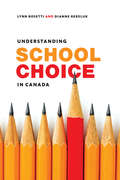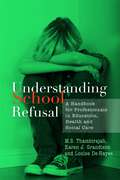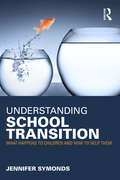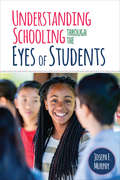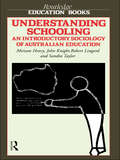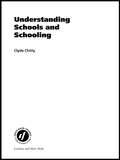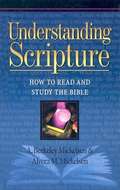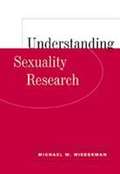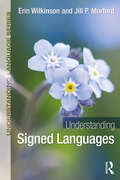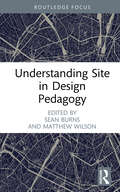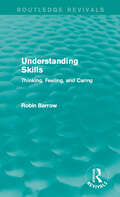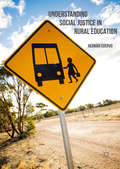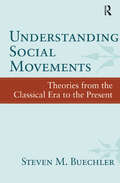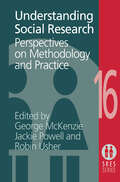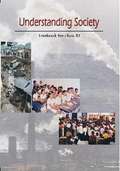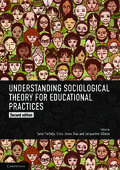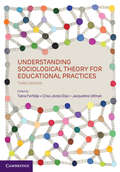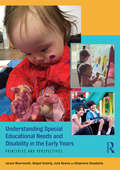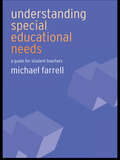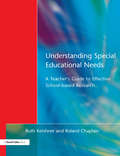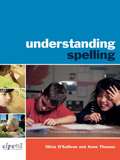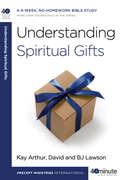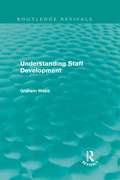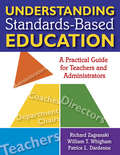- Table View
- List View
Understanding School Choice in Canada
by Dianne Gereluk Lynn BosettiUnderstanding School Choice in Canada provides a nuanced and theoretical overview of the formation and rise of school choice policies in Canada. Drawing on twenty years of work, Lynn Bosetti and Dianne Gereluk analyze the philosophical, historical, political, and social principles that underpin the formation and implementation of school choice policies in the provinces and territories. Bosetti and Gereluk offer theoretical frameworks for considering the parameters of school choice policies that are aligned and attentive to Canadian educational contexts. This robust overview successfully shifts the debate away from ideology in order to facilitate an understanding that the spectrum of school choice policy in Canada is a response to the varying political challenges in society at large. This book is essential reading for those who desire a deeper understanding of school choice policies in Canada.
Understanding School Refusal: A Handbook for Professionals in Education, Health and Social Care
by M. S. Thambirajah Karen J. Grandison Louise De-Hayes` Combining educational and clinical perspectives, and with extensive use of case studies, the authors present recent research into the mental health problems associated with school refusal, such as anxiety and panic attacks, as well as the role that parental support plays in their children's school life. They also discuss the role of home tuition services and pupil referral units in extreme cases of school refusal, and provides concrete strategies for planning and organising services to manage the problem effectively. Understanding School Refusal is a valuable guide for professionals across the disciplines of education, health and social care, and will also be useful for training courses within these fields.' Education Today School refusal is a crippling condition in which children experience extreme anxiety or panic attacks when faced with everyday school life and this handbook aims to explore and raise awareness of the problem of school refusal in children and young people, and provide plans and strategies for education, health and social care professionals for identifying and addressing this problem. Combining educational and clinical perspectives, and with extensive use of case studies, the authors present recent research into the mental health problems associated with school refusal, such as anxiety and panic attacks, as well as the role that parental support plays in their children's school life. They also discuss the role of home tuition services and pupil referral units in extreme cases of school refusal, and provides concrete strategies for planning and organising services to manage the problem effectively. Understanding School Refusal is a valuable guide for professionals across the disciplines of education, health and social care, and will also be useful for training courses within these fields.
Understanding School Transition: What happens to children and how to help them
by Jennifer SymondsSchool transition is a life changing event for children - they are rarely faced with such a powerful set of personal and social changes. These underpin the immediate and longer term wellbeing of children, peer groups, teachers and schools. Understanding School Transition provides a most comprehensive, international review of this important area, complete with practical advice on what practitioners can do to support children’s wellbeing, motivation and achievement. Offering an accessible introduction to children’s psychology at transition, Understanding School Transition explores transition as a status passage, what we really mean by wellbeing, and the ways in which children adapt to new environments. Key chapters focus on: ? Understanding stress and anxiety Children’s hopes, fears and myths at transition Parents’ and teachers’ influence and role Children’s relationships with peers as they change schools Children’s personal and collective identities Motivation, engagement and achievement Supporting the most vulnerable children ? Crucially, it advises how you can help children through implementing transition interventions and evaluating their success in your own school. Illustrated by case studies of experiences in real schools, Understanding School Transition will be essential reading for all training and practising teachers, as well as transition and subject specialists, who want to better understand and influence what happens to children at this critical stage.
Understanding Schooling Through the Eyes of Students
by Joseph F. MurphyPeer through the eyes of students. See school their way. When we act on what students show us, valued outcomes follow. Students know best what engages and bores them and can offer dynamic insight into how to pique their best. When we know how to listen, we learn to increase interest, motivation, and overall achievement through academic press and a supportive culture. This book shows readers how to tap into student insight and adjust thinking to see education and learning through their eyes. Experience new levels of engagement and growth as you learn to: Build a culture of support, safety, and membership through academic excellence Nurture the growth of engaged teaching See things their way and transform your learning environment into a challenging, cohesive, and satisfying model for growth and outcome. "Missing far too long from the school improvement literature is the students’ perspective. Joe Murphy demands that leaders learn to look through students’ eyes to better understand the gaps and opportunities for school improvement and creating positive relationships in which students can flourish. This book lays out the theory and research that undergirds developing a student perspective, and provides strategies and approaches for leaders that should become essential to their preparation and practice." Terry Orr, Director of Future School Leaders Academy Bank Street College of Education "For 40 years educators have sought answers to the question: how do school leaders ‘make a difference’? This quest has taken us in many directions, but few scholars thought to look through the ‘eyes of students’. In this book Murphy provides a missing piece to this important puzzle." Philip Hallinger, Professor Chulalongkorn University
Understanding Schooling Through the Eyes of Students
by Joseph F. MurphyPeer through the eyes of students. See school their way. When we act on what students show us, valued outcomes follow. Students know best what engages and bores them and can offer dynamic insight into how to pique their best. When we know how to listen, we learn to increase interest, motivation, and overall achievement through academic press and a supportive culture. This book shows readers how to tap into student insight and adjust thinking to see education and learning through their eyes. Experience new levels of engagement and growth as you learn to: Build a culture of support, safety, and membership through academic excellence Nurture the growth of engaged teaching See things their way and transform your learning environment into a challenging, cohesive, and satisfying model for growth and outcome. "Missing far too long from the school improvement literature is the students’ perspective. Joe Murphy demands that leaders learn to look through students’ eyes to better understand the gaps and opportunities for school improvement and creating positive relationships in which students can flourish. This book lays out the theory and research that undergirds developing a student perspective, and provides strategies and approaches for leaders that should become essential to their preparation and practice." Terry Orr, Director of Future School Leaders Academy Bank Street College of Education "For 40 years educators have sought answers to the question: how do school leaders ‘make a difference’? This quest has taken us in many directions, but few scholars thought to look through the ‘eyes of students’. In this book Murphy provides a missing piece to this important puzzle." Philip Hallinger, Professor Chulalongkorn University
Understanding Schooling: An Introductory Sociology of Australian Education
by Sandra Taylor John Knight Robert Lingard Miriam HenryFirst published in 1990. Routledge is an imprint of Taylor & Francis, an informa company.
Understanding Schools and Schooling
by Clyde ChittyUnderstanding Schools and Schooling provides students with the knowledge about school policy and process that they need in order to address and respond to current trends and discourses in critical, well-informed ways that will enhance their teaching and job satisfaction.The book presents issues, questions and dilemmas and invites the reader to find their own answers through guided activities, discussion with colleagues and further reading. The book provides a philosophical context for teachers' developing classroom practice and empowers them to participate fully in local and national debate about the nature, purposes and future of compulsory education in the UK and elsewhere.
Understanding Scripture: How To Read and Study the Bible
by A. Berkeley Mickelsen Alvera M. MickelsenWithout question, studying the Bible can be one of the most rewarding experiences of the Christian life. Unfortunately, if you are ill-equipped, studying the Bible can also be intensely frustrating. For example, how do we know when the Bible is being literal and when it's being figurative-and how can we tell the difference without a degree in theology? What do history and culture have to do with studying the Bible? Are there principles for interpreting parables, allegories, prophecies? Is Revelation different? Because questions like these are inescapable, Understanding Scripture: How to read and Study the Bible is a must for the individual interested in maximizing his or her time in Bible study. This book arose out of Alvera and Berkeley Mickelsen's life-long passion for helping people understand the Bible and its significance for their lives. Now in a thorough revision of the 1978 edition co-authored with her husband, Alvera Mickelsen once again shows how principles of interpreting God's word can make Scripture come alive in an unprecedented way.
Understanding Sexuality Research
by Michael W. WiedermanWiederman (Columbia College) explains how to apply critical thinking skills to human sexuality research in order to become a more critical judge of research conducted by others. His first chapters explore the goals of the research, the participants, how questions are posed, what the results mean, and whether conclusions match the research design. Then he details ten case studies. He does not include an index. Annotation c. Book News, Inc., Portland, OR (book news. com)
Understanding Signed Languages (Understanding Language)
by Jill P. Morford Erin WilkinsonUnderstanding Signed Languages provides a broad and accessible introduction to the science of language, with evidence drawn from signed languages around the world. Readers will learn about language through a unique set of signed language studies that will surprise them with the diversity of ways human languages achieve the same functional goals of communication. Designed for students with no prior knowledge of signed languages or linguistics, this book features: A comprehensive introduction to the sub-fields of linguistics, including sociolinguistics, linguistic structure, language change, language acquisition, and bilingualism; Examples from more than 50 of the world’s signed languages and a brief “Language in Community” snapshot in each chapter highlighting one signed language and the researchers who are documenting it; Opportunities to reflect on how language ideologies have shaped scientific inquiry and contributed to linguistic bias; Review and discussion questions, useful websites, and pointers to additional readings and resources at the end of each chapter. Understanding Signed Languages provides instructors with a primary or secondary text to enliven the discourse in introductory classes in linguistics, interpreting, deaf education, disability studies, cognitive science, human diversity, and communication sciences and disorders. Students will develop an appreciation for the language-specific and universal characteristics of signed languages and the global communities in which they emerge.
Understanding Site in Design Pedagogy (Routledge Focus on Design Pedagogy)
by Sean Burns Matthew WilsonThis book examines diverse ways of questioning, critiquing, and communicating site in the creative process of architecture, interior design, urban planning, and historical and cultural studies. The authors use the term site to connote a series of complex, established, or pre-existing conditions – a setting, an atmosphere, an area – to read, to interpret, to relate to, and to engage with, to redefine, or to create in relation to a design prompt. By acknowledging, accommodating, and empowering the physical, intellectual, and cultural characteristics of a site, students question its history, boundaries, posture, and situational aspects. Such inquiries promote a deeper appreciation of a site and thus help students to acknowledge its capacity to influence design throughout the iterative creative process. Understanding Site in Design Pedagogy adds to the body of literature on design studio pedagogy by presenting a collection of essays that challenge normative assumptions about what defines a site and its distinctive qualities. It poses a series of pedagogical questions for how sites might be diversely interpreted and introduced to design students. This study offers chapters that speak to site, memory, and lived experience; multi-scalar thinking about site; connecting to site through sensory phenomenon in interior design; alternate ways of engaging site for learning sustainable principles; and introducing unorthodox forms of site as the impetus to creative endeavours. It offers innovative approaches to scholarship of teaching and learning with respect to diverse readings of site within design education.
Understanding Skills: Thinking, Feeling, and Caring (Routledge Revivals)
by Robin BarrowIt is widely agreed that education should involve the development of understanding, critical thinking, imagination, and emotions. However, this book, first published in 1990, argues that our views to these key concepts are confused and inaccurate, and therefore what we do in schools is generally inappropriate to our ideal. This book will be of interest to students of education and philosophy.
Understanding Social Justice in Rural Education
by Hernán CuervoThis book explores what social justice looks like for rural schools in Australia. The author challenges the consensus that sees the distribution of resources as the panacea for the myriad challenges faced by rural schools and argues that the solution to inequality and injustice in rural settings has to take into account other important dimensions of social justice such as recognition and association. These include teachers' concerns for issues of power, respect, and participation in their work that extend to policy-making processes and implementation; students' post-school aspirations and, finally, parents' hopes and fears for their children's futures and the sustainability of their community. The book brings together political and social theory with education and youth studies, provides new insights about the complex nature of schooling in rural places, and makes a strong connection between schooling and the people and communities it serves.
Understanding Social Movements: Theories from the Classical Era to the Present
by Steven M. BuechlerIn thirteen succinct chapters, Buechler traces movement theories from the classical era of sociology to the most recent examples of transnational activism. He identifies the socio-historical context, central concepts, and guiding logic of diverse movement theories, with emphasis on: Comparisons of Marx and Lenin; Weber and Michels; and Durkheim and LeBon The Chicago School of the inter-war period The political-sociological approaches of the 1950s The varieties of strain and breakdown theories at the dawn of the 1960s Major paradigm shifts caused by the cascade of 1960s social movements Vivid examples of movements worldwide and coverage of all major theorists Critiques, debates, and proposed syntheses dominating the turn of the 21st century Recent trends (such as cyberactivism and transnational movements) and their theoretical implications"
Understanding Social Research: Perspectives on Methodology and Practice (Social Research And Educational Studies #Vol. 16)
by Robin Usher Jane Powell George McKenzieIn 1991 the Economic and Social Research Council (ESRC) published "Postgraduate Taining Guidelines". Throughout the document emphasis is placed on the need for universities to make postgraduate research students aware of the methodological issues that affect their work.; This text explores the relationship between knowledge, methodology and research practice across the broad spectrum of the social sciences in langage that is accessible to researchers at all levels of their research careers. It follows the themes that there is no single practice or correct methodology, and that the diversity and variety in terms of methodology and disciplinary focus are a sign of the sophistication and complexity of the proceses of social research. The text examines socio-cultural contexts of social research and relates them to contemporary shifts in focus such as feminism, critical theory and postmodernism. The importance of selecting the research methodology most appropriate to the subject discipline concerned is emphasized.
Understanding Society class 11 - NCERT
by National Council of Educational Research and TrainingPublished by the NCERT, UNDERSTANDING SOCIETY for std 11, contains a collection of classic and contemporary sociological readings selected for their timeliness, diversity, and interest. The book includes a wide selection of articles that are intriguing and were selected to engage student's interest, to reflect the richness of sociological thought, and to address issues that have emerged in recent years.
Understanding Sociological Theory for Educational Practices
by Jacqueline Ullman Tania Ferfolja Criss Jones DiazUnderstanding Sociological Theory for Educational Practices introduces readers to the contemporary classroom through the lens of sociological theory. By compelling readers to think critically and reflexively this book helps future teachers create a welcoming and equitable learning environment for all students. This edition has been updated to include the latest research and resources, including links to the Australian Professional Standards for Teachers (APST) to help readers connect the theory with their practice. Learning is supported through pedagogical features including key terms, case studies, end-of-chapter reflection questions and recommended resources. A new companion website features a curated suite of reading materials, extension questions and links to online resources. Understanding Sociological Theory for Educational Practices is an essential resource that enables teachers to confidently navigate the topics of diversity, disadvantage, discrimination and marginalisation in a range of educational contexts.
Understanding Sociological Theory for Educational Practices
by Jacqueline Ullman Tania Ferfolja Criss Jones DíazA sound knowledge of sociological theory allows educators to think critically about the complexities of education for all children, young people, their families and communities. Understanding Sociological Theory for Educational Practices introduces the diversity of contemporary learning environments to readers. It uses a sociological lens to analyse relevant theoretical concepts, encouraging all educators to consider the impact of the learning environment they cultivate on their students. This third edition has been thoroughly updated, with new chapters covering a range of contemporary issues in education. The chapters point to the need to acknowledge Indigenous knowledges in educational settings; to include gender and sexuality diversity; and to address harassment, disadvantage, inequity and exclusion experienced by vulnerable students and their communities. Other areas related to home language support and multilingual education; schooling for refugee background students; and migrant family connections in postcolonial settings are also explored.
Understanding Special Educational Needs and Disability in the Early Years: Principles and Perspectives
by Janice Wearmouth Abigail Gosling Julie Beams Stephanie DavydaitisThis key text provides essential tools for understanding legislation, policy, provision and practice for children in the early years, particularly young children with special educational needs and disability (SEND). Based on extensive research and the four areas of need as defined in the Special Educational Needs and Disability Code of Practice: 0 to 25 Years (DfE, 2015), the book charts the development of young children and their growing constructions of learning, communication, language, motor movement and emotion.Providing material that translates into practice in a straightforward and practical way, this text is packed full of personal accounts and case studies, enabling readers to appreciate what the experience of SEND in the early years means for families and professionals, and also to learn more about how they might understand and respond appropriately to a child’s needs. Understanding Special Educational Needs and Disability in the Early Years will be of interest to students studying Early Years courses, families, SENDCOs, teachers and other staff supporting young children with a range of special educational needs and disabilities.
Understanding Special Educational Needs: A Guide for Student Teachers
by Michael FarrellTeachers need to be fully equipped to respond to diversity in today's classrooms now more than ever before. The Professional Standards for Qualified Teacher Status and Induction Standards are now the driving force behind initial teacher education, and students will need to demonstrate their competence against these, and in particular, their understanding of Special Educational Needs in today's inclusive classrooms. Each chapter of this indispensable text explores an important topic within SEN and directly relates it to the competencies, making it an essential course companion. Chapters on topics relating to the code of practice, school policy, literacy and numeracy, ICT, emotional and behavioural difficulties and dealing with parents all follow a similar template, which includes: a commentary on the relevant professional standards contextualising of the standards what teachers can do to promote effective practice. Detailed referencing will lead students to pursue more detailed individual texts, which address many of the issues in greater depth. This is an ideal, highly accessible text for student and new qualified teachers who need a reliable introduction to today's vital issues within Special Educational Needs.
Understanding Special Educational Needs: A Teacher's Guide to Effective School Based Research
by Ruth Kershner Roland ChaplainNew and experienced teachers working with children with special needs in mainstream or special school settings are increasingly discovering the value of research to inform and improve their teaching. This highly accessible text features: · identification of the key research issues which relate to different aspects of SEN and inclusion · guidance on how to carry out research in order to enhance teaching and learning for children whose progress is causing concern · explanations of a range of approaches to research, including empirical studies of individuals, groups and institutions with children, parents, teachers and other professionals · advice on how to use and disseminate research findings The authors support their basic guidance with a variety of examples of published research and they offer a framework and practical suggestions for planning and carrying out school-based investigations with different purposes in mind. This text will be relevant to teachers and SENCOs, and to mentors and tutors in their supporting role.
Understanding Spelling
by Olivia O'Sullivan Anne ThomasHow do children learn to spell and what kinds of teaching support them most effectively? Based on a three-year longitudinal study of children's spelling in different primary classrooms, Olivia O'Sullivan, Assistant Director of the Centre for Literacy in Primary Education and Anne Thomas, the former Inset Director of the Centre for Literacy in Primary Education, pose a number of important questions: what kinds of knowledge are involved in spelling? what are the links between learning to read and learning to spell? what kinds of systematic teaching and interventions make a difference to children's progress? Packed with case studies, photographs and examples of children’s work, this unique book sets out the most effective approaches to spelling and provides teachers with a broad set of principles on which to base their teaching. This is an invaluable resource for any teacher or trainee teacher wishing to raise standards in spelling in their classroom.
Understanding Spiritual Gifts (40-Minute Bible Studies)
by Kay Arthur David Lawson Bj LawsonWhat Are Spiritual Gifts?The subject of spiritual gifts can seem complicated: Who has spiritual gifts--""spiritual people" or everybody? What are spiritual gifts anyway?Understanding Spiritual Gifts takes you straight to God's Word to discover answers from the Gift-Giver Himself. As you dig into Bible passages about God's design for each of us, you'll find out that spiritual gifts aren't complicated--but they are life-changing. Here you will uncover what spiritual gifts are, where they come from, who has them, how they are received, and how they work within the church. As you study, you will have a new vision for how you can use your God-given gifts to bring hope to your home, your church, and a hurting world. 40 Minutes a Week Could Change Your Life!The 40-Minute Bible Studies series from the teaching team at Precept Ministries International tackles the topics that matter to you. These inductive study guides, designed to be completed in just six 40-minute lessons with no homework required, help you discover for yourself what God says and how it applies to your life today. With the leader's notes and Bible passages included right in the book, each self-contained study is a powerful resource for personal growth and small-group discussion.From the Trade Paperback edition.
Understanding Staff Development (Routledge Revivals)
by Graham WebbFirst published in 1996, this book charts the philosophical landscape of staff development at a time when the subject of ‘quality’ in university teaching and learning was under examination. Graham Webb considers three main issues in his research. He focuses on what the basis for educational and staff development actually is and looks at the weaknesses of the then current practices, as well as deliberating over the future of informed staff development. This book will be of interest to staff developers of all kinds and more generally, to anyone concerned with education and human development.
Understanding Standards-Based Education: A Practical Guide for Teachers and Administrators
by Richard A. Zagranski William T. Whigham Patrice L. DardenneThis comprehensive handbook—which includes action plans, ready-to-use charts, rubrics, and real-world examples—shows educators how to design a curriculum that meets today's performance and assessment goals.
